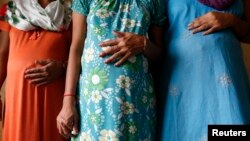Columbus Mavhunga
In much of Africa, including Zimbabwe, women struggling to have children often face stigma and ridicule. To help overcome the problem, two Zimbabwean doctors in 2017 re-opened the country's only in vitro fertilization clinic.
Since the clinic re-opened in 2017, several years after its previous owner retired, IVF Zimbabwe says it has helped about 120 women have babies through in vitro fertilization.
Dr. Sydney Farayi, who runs the clinic with Dr. Tinovimba Mhlanga, said some couples struggle to have children and turn to the wrong sources for help.
"The most hindering obstacle people from seeking assistance is lack of knowledge.... Imagine how many people have stayed together for one year and still failing to conceive, but do not know where to go and get assistance. People are not sure where to go. Normally people will turn to go to traditional, faith healers which are cheap or easy to get but without any good outcomes from there," said Farayi.
Farayi said she and Mhlanga are happy when they help couples reach their goal.
“The value is really seen in the happiness and joy which we are bringing to sub-fertile couples in terms of assisting them to conceive and having a baby. The joy is real and it’s something which is touching, personally affecting also us, as individuals and clinicians, so basically assisting couples to conceive is helping marriages to continue, the unions to continue and also bringing livelihoods to people’s lives,” said the doctor.
One of those who have benefitted from IVF Zimbabwe is a 30-year-old woman who is expecting to deliver next month. Her first marriage collapsed after seven years of failing to conceive. As she narrates her ordeal with in-laws and community, she does not want to be identified.
“The blame would always come to us women. Maybe there is something that you did. Or maybe you didn’t grow well. To be honest it was a lot of negativity coming from the backstab,” she said.
The United Nations’ World Health Organization says failure to conceive in Africa is largely blamed on women, although half of all infertility cases can be traced back to men.
Dr. Nancy Kidula – from the WHO’s regional office for Africa - said infertility problems are common and can be overcome. Via a messaging application, Kidula said in Africa, many governments are more focused on health problems like epidemics, infectious diseases and malnutrition.
“Therefore, infertility will turn to fall quite low on the priority list. Fertility treatment is also very expensive to the extent that even insurance companies are reluctant to fund fertility management," she said.
Patients at IVF Zimbabwe say they pay around $4,000 for treatment – a huge sum for the average person in Zimbabwe.
But to clients ready to welcome their first child after a long wait, the investment is worth it.




